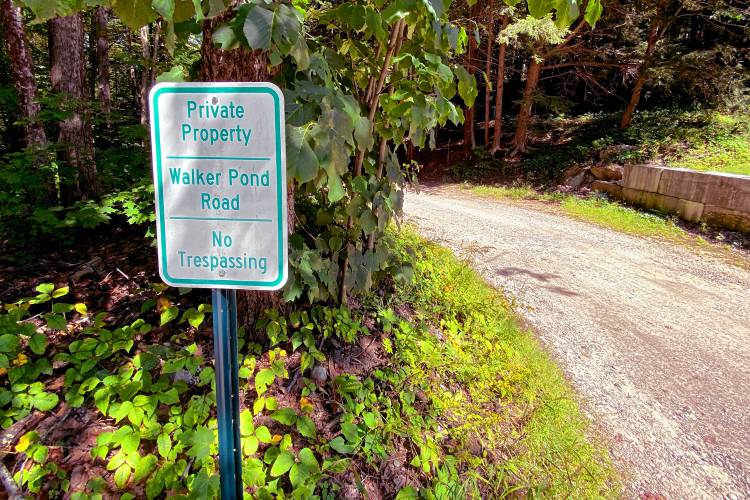Webster returns focus to illegal land sale along Walker Pond

The entrance of Walker Pond Road in Webster where town treasurer Bruce Johnson bought land across from his residence. GEOFF FORESTER
|
Published: 02-07-2024 4:41 PM
Modified: 02-08-2024 5:34 PM |
Webster residents will soon face a looming question: Should the town seek the return of two properties that were illegally sold along pristine Walker Pond?
The petitioned warrant article calls for the return of two town-owned parcels, each 1.5 acres in size along the 200-acre pond. These parcels were purchased by former selectman and town treasurer Bruce Johnson in October 2019 for $7,000 without open competitive bidding, violating both state law and town policy. The parcels were valued at $44,800.
Although Johnson was found guilty of a Class B misdemeanor in September 2021 and fined $1,200, he still retains ownership of the land.
David Nesbitt said the continued discussion about the illegal land sale to Johnson needs to be put to rest.
“If I can say, this is like Groundhog Day all over again,” Nesbitt said Tuesday. “This is really getting to absurdity. We need to get past this. This is really a black eye for Webster.”
Nesbitt is married to Christine Schadler, who played a role in the clandestine land sale. Schadler was a member of the select board in 2019 when they went into non-public session and agreed to sell the land to Johnson. She was one of three who signed the deed transferring ownership of the property to him. More recently, Schadler sold her camp and 1.9 acres of land at 132 Walker Pond Road to Johnson for $75,000, furthering his land holdings around the pond to 9.3 acres.
Both Nesbitt and Schadler currently sit on the town’s Conservation Commission.
While Nesbitt wants to move on from the issue, others, like Gordon Welch, insist on dealing with it.
Article continues after...
Yesterday's Most Read Articles
 New Hampshire legalizes public alcohol consumption in designated ‘social districts’
New Hampshire legalizes public alcohol consumption in designated ‘social districts’
 New Hampshire providers brace for Medicaid changes that reach beyond healthcare
New Hampshire providers brace for Medicaid changes that reach beyond healthcare
 Warner town administrator granted restraining order against selectman
Warner town administrator granted restraining order against selectman
 Hotel makeover underway in downtown Concord
Hotel makeover underway in downtown Concord
 Opinion: Dear Gov. Ayotte, let’s talk about the books
Opinion: Dear Gov. Ayotte, let’s talk about the books
 State rules Epsom must pay open-enrollment tuition to other school districts, despite its refraining from the program
State rules Epsom must pay open-enrollment tuition to other school districts, despite its refraining from the program
“It’s going to come back and bite us. It’s going to do it over and over and over again until the town does something about it,” Welch said. “I’m going to be here that day [town meeting] and I just want to see. I’m going to be close to the door because somebody’s going to get their feelings hurt.”
In addition to Johnson’s property that he acquired from the town, several other parcels were legally purchased from the water district by current and former town officials who already live along the pond. Voters at town meetings were never asked if the parcels should be acquired for public use. The road leading to the pond has no trespassing signs warning visitors to turn around.
This week, Webster held its budget public hearing, which foreshadowed the issues facing voters at this year’s town meeting.
Last year, Webster stood out as one of the few towns witnessing a decrease in its operating budget. However, this year the operating budget has increased to $1.82 million, reflecting an 11.4% increase from the previous year.
Select board chair David Hemenway attributed this rise to inflationary pressures, including increased costs in insurance, wages, contract renewals and goods and services.
Among the proposed expenses is the allocation of nearly $47,000 for the purchase of a new police cruiser to replace the aging 2016 model.
Stephen Adams, Webster’s police chief, emphasized the urgent need for this replacement, citing the present vehicle’s miles at more than 300,000.
“It’s going to start costing us a lot of money. We’ve never had to replace a motor or transmission. And we wouldn’t be able to run a car if we did that because it would overspend our complete budget just about,” said Adams.
At the town meeting in March, residents will be asked to vote on the new Hopkinton-Webster refuse disposal agreement.
The revised agreement, which permits Webster and Hopkinton to jointly operate the transfer station on 491 E. Penacook Road, maintains most of the original terms from 1975, except for the removal of the refuse disposal committee.
In the new agreement, the select boards will be the policymakers, while the day-to-day operations will be carried out by Hopkinton.
Aside from changes to the language, the revised draft emphasizes flexibility for both towns. It includes provisions for towns to withdraw or opt into new programs independently, without being compelled to implement decisions made by one town alone.
(Editor’s note: This article has been changed to reflect Chris Schadler’s role on the Webster Select Board in 2019 and to correct the first name of Select Board Chair David Hemenway. This information was incorrect.)







 ‘A little piece of everything I like’: New Pittsfield barbershop brings more than a haircut to downtown
‘A little piece of everything I like’: New Pittsfield barbershop brings more than a haircut to downtown NH judge decides to pause Trump’s birthright citizenship order
NH judge decides to pause Trump’s birthright citizenship order Canterbury honors ‘real heroes’ with updated Military Veterans’ Project
Canterbury honors ‘real heroes’ with updated Military Veterans’ Project Look, up in the sky! It’s… an Airstream trailer?
Look, up in the sky! It’s… an Airstream trailer?
